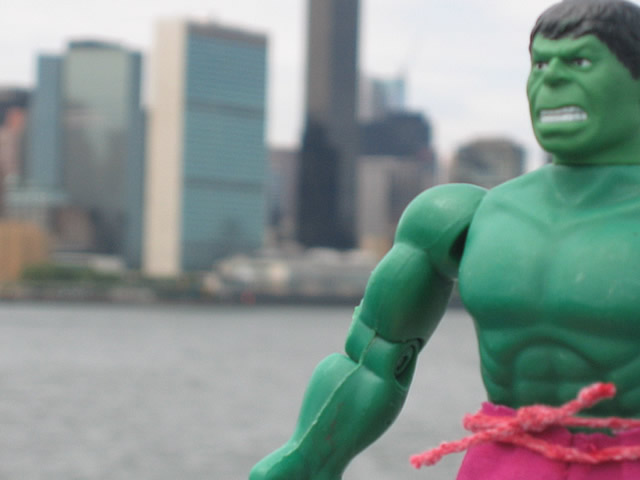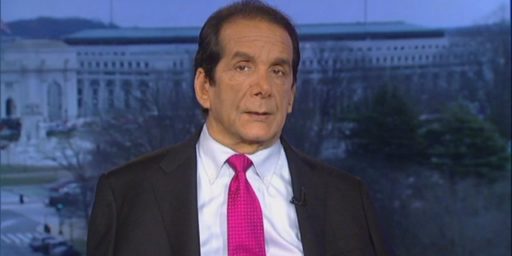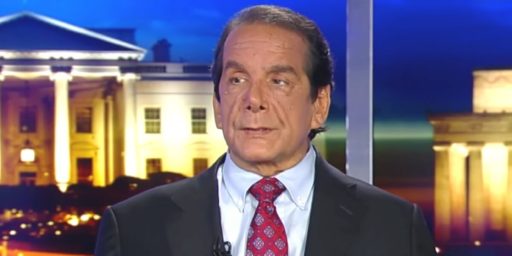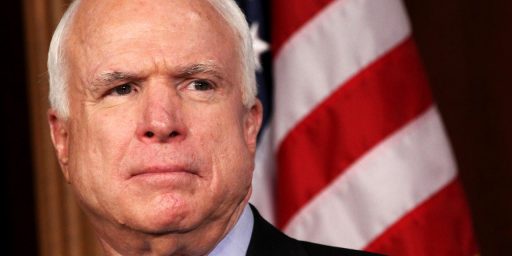Does John McCain Want to Kill the UN?
 During a major foreign policy address yesterday, John McCain talked about his plan to create a League of Democracies. Charles Krauthammer sees a plot to do away with the United Nations:
During a major foreign policy address yesterday, John McCain talked about his plan to create a League of Democracies. Charles Krauthammer sees a plot to do away with the United Nations:
Well, I like the idea of the league of democracies, and only in part because I and others had proposed it about six years ago. What I like about it, it’s got a hidden agenda. It looks as if it’s all about listening and joining with allies, all the kind of stuff you’d hear a John Kerry say, except that the idea here, which McCain can’t say, but I can, is to essentially kill the U.N.
See the video here.
Ben Armbruster thinks Krauthammer is on to something
After all, he backed anti-U.N. crusader John Bolton’s nomination as the organization’s U.S. ambassador and secretly pushed his confirmation. Bolton famously said “there is no such thing as the United Nations” and if the U.N. building in New York “lost ten stories, it wouldn’t make a bit of difference.”
Well, here’s what McCain actually said on the subject:
The United States must lead in the 21st century, just as in Truman’s day. But leadership today means something different than it did in the years after World War II, when Europe and the other democracies were still recovering from the devastation of war and the United States was the only democratic superpower. Today we are not alone. There is the powerful collective voice of the European Union, and there are the great nations of India and Japan, Australia and Brazil, South Korea and South Africa, Turkey and Israel, to name just a few of the leading democracies. There are also the increasingly powerful nations of China and Russia that wield great influence in the international system.
In such a world, where power of all kinds is more widely and evenly distributed, the United States cannot lead by virtue of its power alone. We must be strong politically, economically, and militarily. But we must also lead by attracting others to our cause, by demonstrating once again the virtues of freedom and democracy, by defending the rules of international civilized society and by creating the new international institutions necessary to advance the peace and freedoms we cherish. Perhaps above all, leadership in today’s world means accepting and fulfilling our responsibilities as a great nation.
One of those responsibilities is to be a good and reliable ally to our fellow democracies. We cannot build an enduring peace based on freedom by ourselves, and we do not want to. We have to strengthen our global alliances as the core of a new global compact — a League of Democracies — that can harness the vast influence of the more than one hundred democratic nations around the world to advance our values and defend our shared interests.
At the heart of this new compact must be mutual respect and trust. Recall the words of our founders in the Declaration of Independence, that we pay “decent respect to the opinions of mankind.” Our great power does not mean we can do whatever we want whenever we want, nor should we assume we have all the wisdom and knowledge necessary to succeed. We need to listen to the views and respect the collective will of our democratic allies. When we believe international action is necessary, whether military, economic, or diplomatic, we will try to persuade our friends that we are right. But we, in return, must be willing to be persuaded by them.
This is a very broad internationalism, encompassing not just “Old Europe” but emerging democracies as well.
Further, McCain has been talking about a “League of Democracies” for months. When he brought up the idea in a blogger conference call last October, I was able to ask him directly:
I was able to get in the first question and followed up on this idea, asking whether he was talking about a “NATO Plus” organization or something else. McCain replied that he envisioned something more along the lines of ASEAN or the G-8, a somewhat formal IGO that would have regular meetings but no standing forces. In follow-up, I inquired whether he thought this meant that NATO and the UN Security Council, as presently constituted, were failures. He said that, no, those organizations have their purposes but that NATO was a military alliance whereas his League of Democracies would focus mostly on non-military solutions such as economic sanctions, trade, diplomacy, and public relations.
Now, Krauthammer is right that using an IGO other than the UN to accomplish purposes that the UN was chartered to do weakens the UN by making it less vital. But the fact that we have created dozens of multi-lateral organizations over the years to get around the UN’s inability to function would seem to demonstrate that the UN doesn’t need much help in being weak.
Bolton was fundamentally right when he said, “There is no such thing as the United Nations. There is only the international community, which can only be led by the only remaining superpower, which is the United States.” (Yes, context helps.) The UN isn’t an organism which can be killed but rather a building and a mechanism through which sovereign states attempt to transact business. Attempting to get that business done through a smaller coalition of more like-minded states only makes sense, and it’s a far sight better than either going it alone or waiting on the UN to achieve consensus.
via Memeorandum
Photo Credit: Traveling Mego Hulk






I don’t think the problem is the creation of another multi national oranization. I think the UN can exist even if there is the creation of an organization that is democracies only.
I think the fear, and a legitimate one, is that the US would fund this one at the expense of the UN. It isn’t the existence of other organizations that would be the death nell of the UN, it is the withdrawal of US funds.
Great picture of McCain there.
“Don’t make me angry … you wouldn’t like me when I’m angry.”
Slightly more substantively, McCain’s idea will last about as long as it takes for some reporters to ask him, preferably on video, whether Egypt, Saudi Arabia, Russia, Iran, and Venezuela will be admitted to the new League of Super-Democratic Friends.
Anderson gets it.
What happens when the League of Democracies tries to impose its authority on a non-democracy and the latter says it doesn’t recognise the authority of a body it hasn’t been invited to send representatives to and has no voice at?
We bomb them?
Regards, C
Wow. McCain was far from my first choice as nominee but more talk like this and I’ll downright like the guy.
I suppose we could bomb countries to impose our will but wouldn’t the more realistic approach be economic sanctions of one sort or another? We impose unilateral sanctions on countries now and they don’t get to send representatives to congress. By keeping the UN alive those excluded from the LoD wouldn’t feel voiceless so turning away those mentioned would be much easier.
Heck, the world already hates us so why not?
He answered that question in the press conference that I summarized above.
It’s not about imposing authority but about achieving better working relations, information sharing, and consensus. But, yes, they’d have some ability to influence others short of bombing them.
And what happens when members of this LoD ,say,just as an example France and Germany disagree when the US decides it’s time to attack someone?
Do they have to have to sit through more ‘axis of weasel’ & ‘freedom fries” & ‘old europe” stuff.
Or will the US just set up another body ‘The League of English Speaking Democracies’ and so on until it’s it’s just the US ?
Realistically, why on earth should any other democracy take this seriously ?A body whose sole purpose is to allow the US to do whatever it wants?
Oh they might join but by and large their foreign ministers will go to the UN and their assistants assistants will go to this LoD.
I never will understand people like the previous poster:
We (the US) are always supposed to subordinate our national interests for the “greater good” while other nations are expected to act in their own interests.
The UN has meaning only to small (and usually loud) wannabe countries…and the State Department careerists who get to live well off the taxpayer.
If someone thinks the UN brings value to US security, what is it?
And please, no value of “dialogue”.
UN as an organization is loosing its utility for U.S. Russia and China are increasingly challenging U.S. Israel can not be adequately protected under the current UN. since at least there is one resolution that puts the 1947 borders on record.
So UN has to be liquidated in favor of an organization in which the interests of the united states can be better protected and represented.
“I never will understand people like the previous poster:
We (the US) are always supposed to subordinate our national interests for the “greater good†while other nations are expected to act in their own interests.”
Hmm, that bears no resemblance to anything i actually said….
I observed that whilst McCain(and other americans) might like this proposal , there’s absolutely no benefit to any of the other democracies in climbing on board.
Indeed given the sneers and insults that other democracies received from the US (including McCain) when they disagreed over iraq why on earth would they sign up to a project which appears to have as its sole purpose to try and make it easier to get the US some form of rubber stamp of international approval for whatever scheme it comes up with next.